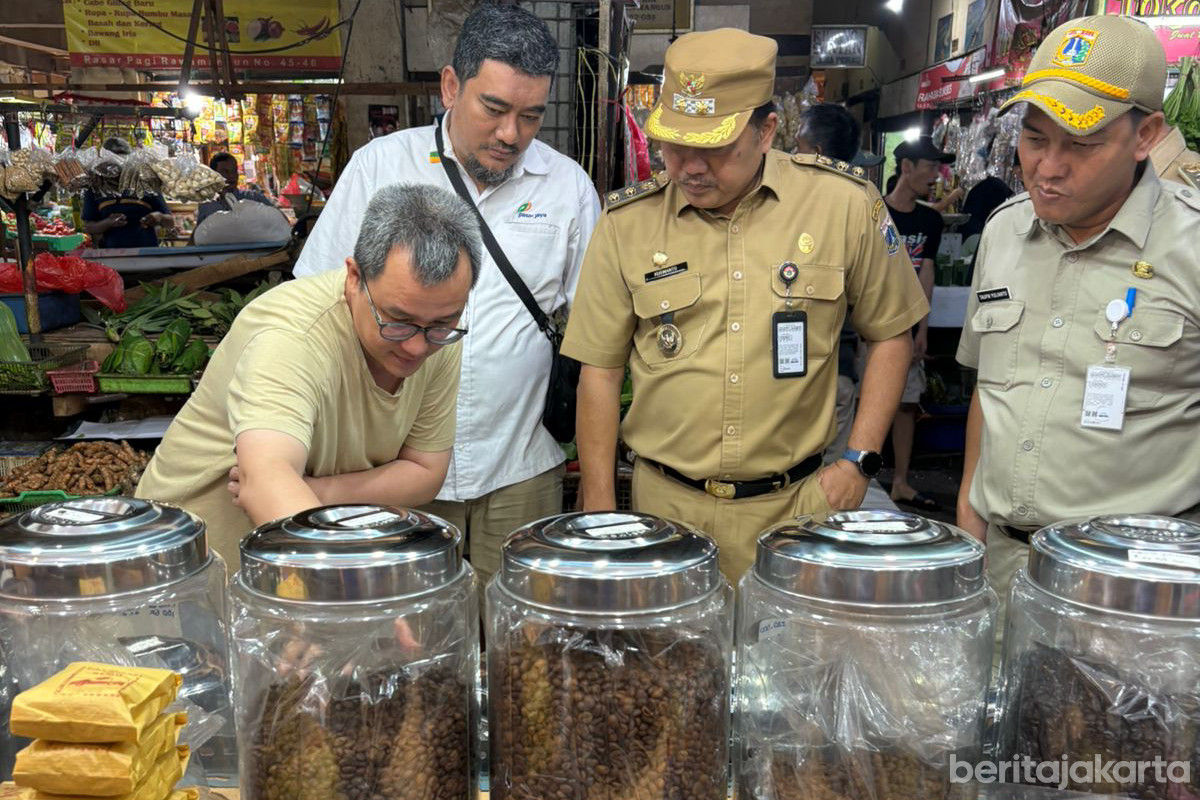

Saturday, September 27th 2025 Reporter: Nurito Translator: Rizky Mawardi 326

(Foto: Nurito)
For coffee lovers and connoisseurs, Rawamangun Market on Jalan Pegambiran, Pulo Gadung, East Jakarta, is not just a place to shop for vegetables or light cakes.
coffee barista who has been around since 1965
Located on the first floor of this traditional market stands the 3x4 square meter Kopi Bemo kiosk which has been a legend since 1965. As many as 30 types of Indonesian coffee are served at affordable prices.
The East Jakarta Deputy Mayor, Kusmanto along with the Head of Food Security, Maritime and Agriculture Sub-agency, Taufik Yulianto, and Deputy of Pulo Gadung District, Agus Purwanto also enjoyed the coffee here.
"This is very interesting because there is a coffee barista who has been around since 1965. It is rare to find something like this," he said, Saturday (9/27).
He hopes that Kopi Bemo will be able to boost the number of visitors and revive the market's enthusiasm so that Rawamangun Market will become more widely known.
The owner of Kopi Bemo, Edward Nurjadi (49), admitted that he is the second generation to continue his uncle's business.
"My uncle started this Kopi Bemo shop. He used to sell coffee grinders. Then he became interested in selling coffee beans as well. I've been running it since 2011," he admitted.
This kiosk is open everyday from 6 AM to 4 PM. However, on holidays or public holidays, operating hours are limited to 2 PM, as the regular market is already quiet.
He explained that the name Kopi Bemo was born from the history of the Bemo (three-wheeled vehicle transportation) base in front of Rawamangun Market in 1965. Bemo drivers often stopped by to drink coffee at this kiosk. There was no sachet coffee available at that time.
Edward added that Kopi Bemo used to grind 100 to 120 kilograms of various coffee beans daily. Initially, they only sold Lampung Robusta, Toraja Robusta, Toraja Arabica, East Java/Dampit Robusta, and special blends.
"Now, due to fierce competition from sachet coffee, street vendors, and coffee shops, the grinding volume has dropped to around 30 kilograms per day. This number does not include orders from hotels, restaurants, and cafes, which purchase 10 to 20 kilograms per week, and even orders from outside Java," he explained.
Accepting the challenge, Edward increases the quality of grade 1 and grade 2 coffee beans with a total of 30 coffee variants from all over the archipelago.
The selling price varies from Rp 160,000 per kilogram for Lampung Robusta to Rp 400,000 per kilogram for Ijen Arabica.
"Robusta Sidikalang Premium, Robusta Dampit, Robusta Vietnam are suitable for mixing with milk, and Robusta Aceh is the buyers' favorites," he added.
Each customer is required to sample a cup of coffee to their liking before purchasing. This atmosphere makes Kopi Bemo more than just a coffee shop, but a place to learn about Indonesian flavors.
Edward plans to open a coffee shop on the ground floor and roast his own coffee beans so that Rawamangun Market will not only be known with vegetables, but also a culinary center like a modern market.
"I hope my coffee business can grow further to preserve and promote Indonesian coffee," he hoped.